Defense Lawyers Seek to Block Special Counsel Report in Trump Documents Case

© Saul Martinez for The New York Times

© Saul Martinez for The New York Times
南方周末记者 吴超
责任编辑:张玥

全国规模以上工业企业利润同比下降4.7%。AI制图
2024年12月27日,国家统计局公布数据显示,1-11月份,全国规模以上工业企业实现利润总额66674.8亿元,同比下降4.7%。
其中,国有控股企业利润总额20387.7亿元,同比下降8.4%;私营企业利润总额19649.1亿元,下降1.0%;外商及港澳台投资企业利润总额16062.9亿元,下降0.8%。
全国规上工业企业收入仍保持增长,但利润在下降。
1-11月份,规模以上工业企业实现营业收入123.48万亿元,同比增长1.8%;营业收入利润率5.40%,同比下降0.37个百分点。
利润增长最快的是有色金属冶炼和压延加工业,同比增长20.2%;电力、热力生产和供应业同比增长13.5%。
值得注意的是,规上工业企业应收账款及存货均同比增长。11月末,应收账款26.92万亿元,同比增长8.5%;产成品存货6.57万亿元,增长3.3%。
中信证券首席经济学家明明告诉南方周末记者,11月,规上工业企业利润同比下降7.3%,降幅较前值收窄了2.7个百分点,影响企业利润的量、价、利润率等方面均传递出一定的积极信号。
“尽管工业企业利润延续下降,但近期下降的速度有所放缓。”随着增量政策的持续出台,以及经济内生动能的恢复,工业企业盈利状况有望进一步改善。
当日发布的另一个重要数据,是1-11月国有企业营业总收入748971亿元,同比增长1.3%;国有企业利润总额38485.9亿元,同比下降0.1%。
明明介绍,营业总收入同比增长,表明国有企业营收在复杂多变的国内外市场中,依然保持了稳定的
校对:星歌
如果说有哪个地方比北约总部更重要,对冷战的影响更大,那就是兰德公司。兰德公司初期以国防安全相关复杂问题的研究模拟为主业,尤其从研究方法上开创了桌面推演和不确定性下的决策,这使得对数学建模和模拟成为必要的工具。这种对纯粹计算暴力的刚需,离不开超级计算机,而计算机无论过去还是现在都是AI得以发展的必要硬件条件。
具体而言,智库开发和应用通用AI大模型服务研究咨询的主要场景可以简要概括如下:一是数据收集与分析;二是政策模拟与预测;三是作为研究工具和提高研究效率。
作为比较典型的风险与挑战,首先是AI的意识形态基因问题,其次是可能导致的伦理困境与法律合规性,第三是警惕AI的讨好型人格,最后也要警惕对AI的过度依赖。
南方防务智库特约研究员 田士臣 张嘉懿 吕彦承 南方周末记者 王航
责任编辑:姚忆江
被誉为引领人类历史上的第四次工业革命,以ChatGPT为代表的人工智能技术迅速席卷各个行业产业,推动通用大语言模型在垂直领域的开发应用成为热点。顺应历史洪流和当下这种趋势发展,国内不少智库也开启了通用大模型在研究咨询这个垂直领域开发应用的探索。
开启这一进程,首先是因为智库作为一个典型的代表人类智能的专家密集型组织,天然承担着代表人类社会探索人类智能(Human Intelligence,HI)与人工智能互动博弈边界的神圣使命。
然而,当这扇探索人工智能与人类智能互动博弈的大门被打开之后,人们会发现,AI的发展竟然与现代智库的诞生有着密不可分的历史渊源。

一群人类和机器人并排站立。图片左边以冷色调为主,给人一种冷静、理性的感觉。右边则使用暖色调,传达出温暖、活力的气息。这种对比或许传达了AI眼中的两者差异——虽然各自都是由复杂系统构成的实体,但却拥有独特的特质和价值。(王航使用AI工具生成/图)
智库的历史在中国古代可以追溯到姜子牙、诸葛亮、刘伯温这类典型的军师型智囊。始建于齐桓公田午时期的稷下学宫可称为中国最早的政府智库,而养士、谋士、军师、食客、门客、幕僚、幕宾、谏官、言官、学士、参谋等各种称谓,则折射出典型的中国古代智库参与治国理政的谏文化和谏议制度。
尽管中国的智库文化历史悠久,但智库作为一个术语是从英文翻译过来的舶来品。“智库”一词的英文直译是“思想坦克”(Think Tank),最初在二战期间被用于描述军事战略家聚集在一起讨论计划的房间,后来在致力于研究和政策分析的组织中流行起来。
广义上讲,成立于1831年的英国皇家联合服务研究所 (RUSI),可以被认为是第一个智库,尽管当时并没有被冠以智库之名。1884年在英国成立的社会主义组织费边社,旨在通过研究和倡导影响公共政策,也经常被当作最早智库的例子。
作为美国历史上最悠久的智库之一,不得不提到于1910年创立的专注于国际和平与政策分析的卡内基国际和平基金会。1916年成立的布鲁金斯学会则是一家基于事实研究国家公共政策
校对:星歌 吴依兰











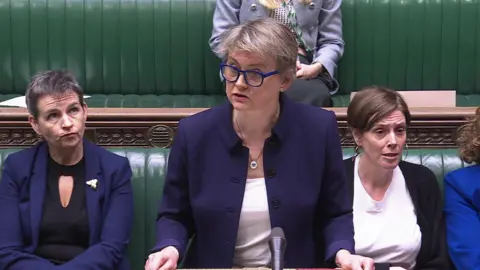 Parliament
ParliamentHome Secretary Yvette Cooper has said those who cover up or fail to report child sexual abuse could face professional or criminal sanctions under a new offence to be introduced this year.
The proposal was one of 20 recommendations made by Professor Alexis Jay following her seven year inquiry into child sexual abuse, which concluded in 2022.
Cooper said the change would be added to the Crime and Policing Bill this spring.
The Conservative shadow home secretary Chris Philp welcomed the move but urged the home secretary to announce a national statutory public inquiry into sexual abuse of children by grooming gangs.
He argued that the Independent Inquiry into Child Sexual Abuse (IICSA), led by Prof Jay, had been "mainly directed" at other child sexual abuse issues and only covered six of the towns involved in the "gang rape scandal".
"We need to get to the truth," he told MPs, and said an inquiry, with powers to compel witnesses to attend and give evidence under oath, was needed.
He added that if the government would not agree to an inquiry, the Conservatives would try to amend the Children's Wellbeing and Schools Bill to force the government to hold one.
Cooper did not commit to holding a new inquiry and instead stressed the importance of implementing the recommendations of inquiries that had already been completed.
Introducing mandatory reporting of child sexual abuse was one of the key recommendations from the IICSA report.
It said there should be a legal requirement for those who work in "regulated activity or work in a position of trust" to report abuse in certain circumstances including if they "observed recognised indicators" of child sexual abuse.
The report also said it should be a criminal offence not to report abuse if they are told about it by the child or perpetrator, or if they have witnessed a child being sexually abused.
The previous Conservative government had committed to introducing mandatory reporting, but did not specify sanctions for failing to do so.
Addressing the House of Commons on Monday afternoon, Cooper said she would introduce mandatory reporting and a new offence targeting those who fail to report abuse or cover it up.
The home secretary also promised to make grooming an aggravated factor in the sentencing of abuse cases and "overhaul" how information and evidence on child sexual abuse is gathered.
Earlier in the day, Prof Jay who now chairs the Act on IICSA campaign group urged ministers to adopt a "clear timeline" to accept all the report's recommendations.
Cooper said Safeguarding Minister Jess Phillips had met with Prof Jay last year and had convened a cross-government group to "drive forward change". She said she would set out timescales following work with a new victims and survivors panel.
Maggie Oliver, a former Greater Manchester police detective who resigned in 2012 over poor handling of abuse cases in Rochdale, told BBC Radio 4's World Tonight that the home secretary's statement on child abuse was "a bit of a kneejerk reaction to international horror at what has happened in our country".
The subject of grooming gangs has come under the spotlight, in part due to interventions on social media from Elon Musk.
The tech-entrepreneur and adviser to US President-elect Donald Trump called safeguarding minister Jess Phillips a "rape genocide apologist" and accused Prime Minister Sir Keir Starmer of being "complicit in the rape of Britain".
Speaking at a press conference, Sir Keir defended his record as director of public prosecutions saying that when he left office "we had the highest number of child sexual abuse cases being prosecuted on record".
He said he enjoyed robust debate but said it had to be "based on facts and truth, not on lies".
"What I won't tolerate is politicians jumping on the bandwagon simply to get attention, when those politicians sat in government for 14 long years, tweeting, talking, but not doing anything about it. Now, so desperate for attention that they're amplifying what the far-right is saying."

 BBC
BBCMcDonald's workers have said they are still facing sexual abuse and harassment, a year after the boss promised to clean up behaviour at the fast-food chain.
One 19-year-old worker, Matt, told the BBC some of his colleagues were scared of going into work, and that managers would "touch up" other members of staff.
Since the BBC's original investigation into the company, the UK equality watchdog has heard 300 reported incidents of harassment. It now plans to intervene again.
A McDonald's spokesperson said the company had undertaken "extensive work" over the past year to ensure it has industry-leading practices in place to keep its workers safe.
The UK boss of McDonald's has been summoned on Tuesday to answer MPs' questions for a second time, including over claims of sexual abuse.
Warning - this article contains distressing content
These claims all relate to events after November 2023, when the boss of McDonald's UK, Alistair Macrow first appeared in front of parliament's Business and Trade Committee.
Mr Macrow told MPs then that the firm was taking action to improve working conditions, after the BBC uncovered widespread concerns over the treatment of staff.
However, one current and two former workers from different parts of the country, claim that the restaurant audits that were promised, were stage-managed by the branches.
More than 700 current and former junior employees are now taking legal action against the firm, accusing it of failing to protect them.

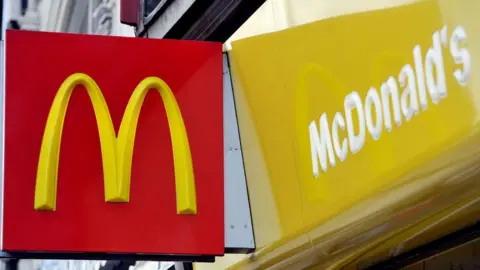 PA Media
PA MediaMatt said he quit his McDonald’s branch in the Midlands last year because of what he calls a "toxic" work environment.
He said he was bullied for having a learning disability and an eye condition.
"And then it was stuff you noticed, managers and staff being racist to other staff. Managers trying to touch other staff up," he said.
He said some staff members felt scared to go into work, because they feared something "horrible" happening.
Matt said the work culture had not changed by the time he left in May.
Alan, not his real name, said he has been repeatedly subjected to "degrading and humiliating" verbal abuse by his colleagues at a McDonald's branch in southwest Scotland.
"It’s just homophobic slurs a lot, sometimes to my face, sometimes behind my back," the 19-year-old said.
When he reported the problem to a senior manager, he says he was told it was "just a bit of banter".
Alan has worked in other fast-food restaurants where he said homophobia was taken more seriously.
"It just seems like McDonald's don't care as much," he said.
Claire, not her real name, who worked at a branch in the Midlands until May 2023, says a shift manager asked her for sex in return for extra shifts, which she refused. She was 17, he was in his 30s.
"You don't expect that to happen," she said. "It was totally inappropriate."
Like most McDonald's workers, Claire was employed on a zero-hours contract
McDonald's outlets are run as franchises, so local managers are responsible for employing the staff for their restaurants. Across the UK, 89% of their workers are on zero-hours contracts.
McDonald's says workers can choose to switch to minimum guaranteed hours. But we have spoken to 50 workers across the country who say they were not given that choice.
Some workers told the BBC the insecure hours leads to an imbalance of power. Others, however, said zero-hours contracts worked well for them.
Claire says she felt "dependent" on her managers for work. "I was always asking for more shifts, as I needed more money," she said.
A McDonald's spokesperson said that in 2018, it offered all employees the choice of a flexible or guaranteed hours contract, and that every staff room should still display information on how to request one.
"Additionally, after four weeks in role, every new employee has a formal conversation with management – in which managers check that employees are aware of the option of a guaranteed hours contract," the company said.
The company said it did not recognise the incident where a manager asked for sex in return for shifts. "If provided with sufficient information we would ensure a full investigation is carried out, and appropriate action taken if necessary," the company said.
Most McDonald's staff are aged between 16 and 25. For many, it is their first job.
Even senior managers are often young.
Elliott, not his real name, was in charge of a store in the South of England by his early twenties. He left last February.
"If I had a sister, or if I had a daughter, I wouldn't want them working in McDonald's," he said.
When the McDonald's boss spoke to MPs in 2023 he said the company had stopped a practice of moving managers around so they could avoid disciplinary action.
But Elliott says that days after Mr Macrow gave evidence, a manager was moved to his store to avoid being disciplined, following allegations they had sent sexually explicit messages to female colleagues who were 16-18 years old.
Following the BBC investigation, McDonald’s brought in outside consultants, Price Waterhouse Cooper (PwC), to audit their restaurants and check on the wellbeing of their staff. But Elliott says the franchise he worked for “rigged” its inspection in February.
"They were meeting the best employees, hand-plucked from different stores," he said. "The people that can be coached on the correct answers."
According to Elliot the audit gave the restaurant a 100% rating. Yet, he told us, two months before the audit, a manager working there had been accused of performing a Nazi salute to a Jewish employee. He said PwC was not told of this allegation.
"I think I am a bit traumatised by it," he said. "And I think I'll continue to have bad memories of my employment for the rest of my life."
PwC said that while it doesn't comment on individual clients, its site visits are "subject to a stringent set of processes" and are refined as required.
A McDonald's spokesperson said PwC's independent site visits "play a crucial role" in assessing each restaurant against specific criteria and ensuring standards are met.
"In the few instances where our expectations have not been met, we have taken prompt corrective action," the spokesperson said.
"The assessment procedures are under constant review by PwC and were refined early in the programme to ensure that employee interviews - which form part of the assessment - are selected randomly by independent assessors, further safeguarding the integrity of the process."

 Getty Images
Getty ImagesThe BBC first began investigating working conditions at McDonald's in February 2023, after the company signed a legally binding agreement with the Equality and Human Rights Commission (EHRC), in which it pledged to protect its staff from sexual harassment.
After our investigation was published in July 2023, McDonald's apologised and set up a new unit to deal with complaints.
The EHRC also set up a dedicated hotline for abuse claims.
More than 160 people approached the BBC with allegations after our initial investigation, while 300 incidents were reported to the EHRC.
Now, the watchdog says it is taking stronger action against the fast-food chain.
In a new statement provided exclusively to the BBC, the EHRC said: “We are actively working with McDonalds to update our ongoing legal agreement in light of serious allegations raised by our work with the company, and the BBC investigation."
Its action plan will involve strengthening the existing measures - which included providing more training and conducting a survey of workers - as well as announcing new steps, the BBC understands.
McDonald's said the agreement with the EHRC was signed "with the intention that it continues to evolve to ensure the robust measures we have in place are aligned with any updated guidance".
Separately, law firm Leigh Day said it had been instructed to start legal action against McDonald's by hundreds of staff and former staff, with more than 450 restaurants implicated in the claims.
A McDonald's spokesperson said: "Ensuring the 168,000 people that work in McDonald's restaurants are safe is the most important responsibility for both us and our franchisees, and we have undertaken extensive work over the last year to ensure we have industry-leading practices in place to support this priority.
"Any incident of misconduct and harassment is unacceptable and subject to rapid and thorough investigation and action."
The company said: "Our relentless focus on eliminating all forms of harassment at McDonald's is led by a newly created team and informed by the experience and guidance of external experts."
It said it had rolled out company-wide programmes to improve safeguarding, drive awareness and enhance training, and in addition to the four existing channels, it had introduced an additional way for employees to speak up, confidentially, at any time, allowing employees to "instantly raise issues digitally", and which was "specifically designed to ensure they feel empowered to speak up".
It also said its new investigations unit was "dedicated to rooting out any behaviour that falls below the high standards" it demands of its workers.
"We are confident that we are taking significant and important steps to tackle the unacceptable behaviours facing every organisation," the spokesperson added.
It said its latest anonymous employee survey showed that 92% of its franchisees' people are now comfortable speaking up, and 93% believe management will act.
"However, we know that we must be constantly vigilant, and we will challenge and confront any behaviour that falls below those standards," it said.
If you have been affected by any of the issues in this story, information and support is available via the BBC Action Line.
Some of the names in this story have been changed to protect identities.

 BBC
BBCWarning: This story contains distressing details.
Just before New Year, 21-year-old Shatha al-Sabbagh was out buying chocolate for her family's children from a shop in Jenin, in the occupied West Bank.
The "fearless" journalism student – who wanted to shed light on the suffering of the Palestinians – was with her mother, two young nephews and another relative.
"She was laughing and saying we'll be up all night tonight," her mother recalls.
Then she was shot in the head.
For Shatha's mother Umm al-Motassem, the pain is still raw. She stops to take a breath.
"Shatha's eyes were wide open. It looked like she was staring at me while lying on her back with blood gushing from her head.
"I started screaming, 'Stop shooting! My daughter is dead. My daughter is dead.'"
But the shooting lasted for around 10 minutes. Shatha died in a pool of her own blood.
Shatha's family holds the Palestinian Authority's (PA) security forces fully responsible for her killing, saying their area is controlled by the PA.
"It couldn't have been anyone other than PA... because they have such a heavy presence in our neighbourhood - no-one else could come or go," she told the BBC.
But the PA blames "outlaws" - the term they use for members of the Jenin Battalion, made up of fighters from armed groups including Palestinian Islamic Jihad (PIJ) and Hamas.
The PA exercises limited self-rule in the Israeli-occupied West Bank.
It launched a major security operation in the refugee camp in Jenin last month targeting the armed groups based there, which they see as a challenge to their authority. Nearly four weeks on, it continues.
The Jenin Battalion is accused of blowing up a car in the camp and carrying out other "illegal activities".
"We have confiscated large numbers of weapons and explosive materials," says the PA's Brig Gen Anwar Rajab.
"The aim is to clear the camp from the explosive devices that have been planted in different streets and alleyways... These outlaws have crossed all red lines and have spread chaos."
Gen Rajab also accuses Iran of backing and funding the armed groups in the camp.
The Jenin Battalion denies links to Iran. In a recent video posted on social media, spokesman Nour al-Bitar said the PA was trying to "demonise" them and "tarnish their image", adding that fighters would not give up their weapons.
"To the PA and President Mahmoud Abbas, why has it come to this?" he asked, holding shrapnel from what he claimed was a rocket-propelled grenade fired at the camp by security forces.

 Getty Images
Getty ImagesThe PA, led by President Abbas, was already unpopular among Palestinians dissatisfied by its rejection of armed struggle and its security co-ordination with Israel.
This anger intensified with the PA's crackdown on the armed groups in the camp, which has been unprecedented in its ferocity and length.
Israel sees those groups as terrorists, but many Jenin locals consider them to be a form of resistance to the occupation.
"These 'outlaws' that the PA is referring to – these are the young men who stand up for us when the Israeli army raids our camp," says Umm al-Motassem.
At least 14 people have been killed in the crackdown, including a 14-year-old, according to the Palestinian health ministry.
Now many Jenin locals say they fear the PA as much as they fear Israel's military raids. Shatha al-Sabbagh's death has only renewed their contempt.
Before she was killed, Shatha shared several posts on social media showing the destruction from the PA operation in Jenin - as well as Israeli raids on the camp last year.
Other posts showed pictures of armed young men who were killed in the fighting, including her brother.
Her killing was condemned by Hamas, which identified her brother as a slain member of the group's armed wing, the Izzedine al-Qassam Brigades.
The group described her "murder... in cold blood" as part of an "oppressive policy targeting the Jenin camp, which has become a symbol of steadfastness and resistance".
Mustafa Barghouti, who leads the political party Palestinian National Initiative, sees the fighting in Jenin as a consequence of the divisions between the main Palestinian factions - Fatah, which makes up most of the PA, and Hamas, which has governed Gaza since 2007.
"The last thing Palestinians need is to see Palestinians shooting each other while Israel crushes everyone," he says.

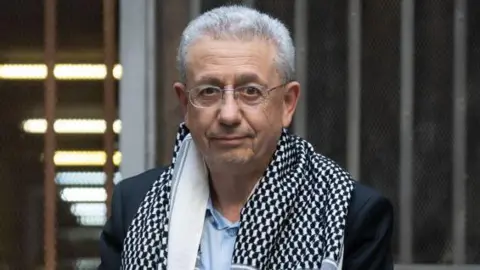 Getty Images
Getty ImagesInside the camp, residents say daily life has ground to a halt.
Water and electricity supplies have been cut off and families suffer from a lack of food, bitterly cold weather and relentless gun battles.
Locals who spoke to us asked for their names to be changed, saying they feared reprisals by the PA.
"Things are dire here. We can't move freely in the camp," says Mohamed.
"All the bakeries, the restaurants and shops are closed. The restaurant I work in opens for a day and closes for 10. When it is open, no-one comes.
"We need milk for the children, we need bread. Some people can't open their doors because of the continuous shooting."
The UN humanitarian agency, the OCHA, has called for an investigation into what it describes as human rights violations by the PA forces.
Gen Rajab said some of the "outlaws" who had "hijacked" the Jenin camp had been arrested and that others with pending cases would be brought to justice.
But Mohamed describes the PA's operation - with innocent people caught in the crossfire - as "collective punishment".
"If they want to go after outlaws, that doesn't mean they should punish the whole camp. We want our lives back."
Even going out to get food or water is a risk, says 20-year-old Sadaf.
"When we go out, we say our final prayers. We prepare ourselves mentally that we may not come back.
"It's very cold. We've taken down the doors in our home to use as firewood just to keep warm."
The BBC has heard similar accounts from four residents in the camp.
My conversation with Sadaf is interrupted by the sound of gunfire. It is unclear where it is from or who is firing. It starts and stops several times.
"Warning shots maybe," she suggests, adding it happens sometimes when PA forces are changing shifts.
Sadaf continues describing the camp, with "rubbish filling the streets and almost going into homes". More gunfire can be heard.
Sadaf's mother joins the call. "Listen to this... Can anyone sleep with this sound in the background?
"We sleep in shifts now. We're so scared they might raid our homes. We're as scared of this operation as we are when the Israeli soldiers are here."
People say security forces have deliberately hit electricity grids and generators, leaving the camp in a blackout.
The PA again blames "outlaws" - and insists it has brought in workers to fix the grid.

 Getty Images
Getty ImagesThe armed groups want to "use the people's suffering to pressure the PA to stop the operation", says Gen Rajab. He says the security operation will continue until its objectives are met.
Gen Rajab says the PA's goal is to establish control over the Jenin camp and ensure safety and stability.
He believes stripping the armed groups of control would take away Israel's excuse to attack the camp.
In late August, the Israeli army conducted a major nine-day "counter-terrorism" operation in Jenin city and the camp, which resulted in severe destruction.
At least 36 Palestinians were killed - 21 from Jenin governorate - according to the Palestinian health ministry.
Analysts say that the PA is trying to reassert its authority in the West Bank and show the US it is capable of taking a role in the future governance of Gaza.
"What would be the harm in that?" says Gen Rajab.
"Gaza is part of the Palestinian state. Gaza and the West Bank are not separate entities. There's no Palestinian state without Gaza. The president [Mahmoud Abbas] has said that and that is our strategy."
But Barghouti says this approach is an "illusion". "All you need is to listen to what [Benjamin] Netanyahu says," he adds.
Under the Israeli prime minister's vision for a post-war Gaza, Israel would control security indefinitely, and Palestinians with "no links to groups hostile to Israel" - so none of the existing major Palestinian political parties - would run the territory.
But the US, Israel's major ally, wants the PA to govern Gaza after the war. Netanyahu has previously ruled out a post-war role for the internationally backed PA.
For the residents of Jenin camp, there has been no let-up in the violence and loss.
"The PA say they're here for our safety. Where's the safety when my daughter was killed? Where's the safety with the non-stop shooting?" Umm al-Motassem cries.
"They can go after the 'outlaws' but why did my daughter have to die? Justice will be served when I know who killed my daughter," she says.

 BBC
BBCJane Graham has been a school nurse for nearly 20 years – and during this time the nature of her work has completely changed. "When I started, the majority of the support we provided was for physical health, like asthma, allergic reactions and injuries," she says. "Now it's mental health."
She has seen a surge in schoolchildren struggling. "It really impacts pupils at secondary school, but some are as young as seven," she explains.
"We're seeing children with depression, anxiety and stress – and that's leading to panic attacks, self-harm and eating disorders. They're not making it to school or are so anxious they cannot attend classes."
GPs, youth workers and social workers I have spoken to shared similar stories, with many pointing out that mental health cases in the young are rising in ever greater numbers.
One in five children and young people between the ages of eight and 25 in England are now thought to have a mental health disorder, according to official figures. Unsurprisingly, the NHS is struggling to keep up.
In 2024 Dame Rachel de Souza, the children's commissioner for England, described the situation as "shocking" and said the system was in "crisis".
What's less clear is why this is happening now.

 PA Media
PA MediaPlenty of explanations have been offered by experts: the pandemic, the cost of living and the advent of social media have all placed additional pressures on the generation now starting out.
But some experts in the field of mental health have raised another question: that is, is there really a mental health crisis or are young people simply not resilient enough?
In other words, are they lacking the capacity to withstand or recover quickly from day-to-day difficulties that generations before them faced too?
This question is a polarising one. The word resilience could be interpreted by some as disparaging, or even toxic, in a similar vein as the term "snowflake generation".
But one of the country's leading experts in child and adolescent psychiatry, Prof Andrea Danese believes that resilience needs to be taken seriously.
While greater awareness of mental health "has generally been a positive thing", according to Prof Danese, who is general secretary for the European Society of Child and Adolescent Psychiatry, he says that he is concerned that it may also have "inadvertently contributed to over-pathologising distress in young people".
Distress should not automatically be seen as a sign of mental ill-health, he continues.
"Facing challenges and distress is normal and important in terms of individual growth," he says. "That's how young people develop emotional resilience – they learn coping skills in the face of many small challenges and build self-confidence about their ability to cope. The narratives we build matter."
Ms Graham, the school nurse, is also of the opinion that many children who she has seen struggling - particularly those with more low level mental health problems - would benefit from becoming more resilient.
She believes that if they were equipped with better coping skills, young people would likely be better placed to deal with the challenges they may be facing before they develop into a full-blown crisis – and this in turn would help ease the pressure on services to focus on those who are at high risk of harm.
"We need to do much better at teaching resilience in schools and how to stay mentally healthy," she says. "But the way we treat children, such as primary school sports days where everyone is declared a winner, doesn't help."
In popular culture, the concept of resilience was popularised in the 1970s, in the wake of research by psychologist Emmy Werner, who studied children in Hawaii from lower-income backgrounds.
More recently it has been the subject of several bestselling books, including Option B: Facing Adversity, Building Resilience and Finding Joy, co-authored by Sheryl Sandberg, who was previously chief operating officer at Meta.
Research by academics carried out in Poland suggests that higher levels of resilience improve life satisfaction and act as a buffer against mental health problems among young people.
Two studies involving young people aged between 13 and 18 found those with greater resilience were more able to develop their own coping strategies when dealing with stress, including seeking support and advice from others, and were less likely to dwell on negative emotions or turn to drugs, alcohol or smoking.


However not everyone is in agreement on the issue of resilience - or the questions around the potential downsides of greater mental health awareness.
Dr Shari McDaid, head of policy and evidence (Scotland and Northern Ireland) at the Mental Health Foundation, argues that any suggestion that increased awareness is to blame for rising rates of mental health problems is "misleading".
She points out that for someone to qualify for treatment for mental ill-health, they must meet a clinical threshold and the support they receive must have been judged to be of benefit.
Rather, greater awareness has led to better "mental health literacy", in her view, which in turn has given people the tools to recognise and manage day-to-day emotions.
"What we need to do is work harder at preventing young people's mental distress from escalating into disorder - and we can do this through a whole-of-society approach that creates mentally healthy communities, schools and workplaces, as well as by fostering young people's personal resilience," she says.
"The two approaches go hand in hand."
Dr McDaid argues that the current generation of children and young adults face a unique set of challenges, pointing out they were the toddlers and infants of the 2008 financial crisis and have also lived through the divides around Brexit as well as the Covid-19 pandemic during their formative years.
"We know adverse events are cumulative - the more you experience the more likely you are to struggle," she says.
Social media also plays a part. While it has benefits, Dr McDaid points out that cyber-bullying and body image pressures, which can be exacerbated on social media, cause additional stress.
"There has always been unrealistic images… but social media has complicated things further," she adds.
Social psychologist Jonathan Haidt argues that advents in the digital world have led to a "great rewiring of childhood", in which children are spending less time socialising in person and more time glued to their screens. In his book The Anxious Generation, he suggests that this affects self-esteem and personal connections, which are crucial to good mental health.
But Prof Danese says that social media usage alone cannot "wholly explain" why mental health problems have become widespread.
It is, he argues, more likely to "amplify" problems rather than cause them. "The causes [of the rise in mental health problems] are complex and I'm not sure we fully understand them."
And it is the cumulative effect of a great many challenges, rather than one in isolation, that creates a perfect storm.
As one young person puts it: "From social media platforms that make us more isolated and anxious, to underfunded mental health services that are on the brink of collapse and a global climate crisis that puts our future at risk - it's no wonder that young people are struggling to stay positive."
Adele Zeynep Walton is 25 years old and has written extensively about the negative impact of the online era on her generation's mental health, including in her book, Logging Off: The Human Cost of Our Digital World.
"While individual resilience can be a great tool to protect us from the severity of the challenges we face and help us bounce back from the struggles of everyday life, to say it can fix the problems facing young people today is like putting a plaster on a gaping wound," she argues.


Instead, she believes the answer lies in tackling the addictive and toxic nature of social media platforms and investing in community spaces - as well as listening to young people themselves.
"What young people need is the recognition that the world we live in today makes it difficult to thrive as a young person and a genuine effort from those in power to tackle those barriers to wellbeing at the root."
Adam Jones, a policy and public affairs manager at mental health charity Young Minds, is also wary of the term resilience, which he argues can be used in a "stigmatising" way.
But he does share concerns that the current approach is "over-medicalised".
More than 600,000 young people aged 15 to 25 in England were prescribed anti-depressants in 2023-24, according to NHS England, and thousands more are believed to have been prescribed other drugs to treat conditions such as anxiety.
"Drug treatment can be useful for some, but clinical guidelines are clear that it should not be the first-line treatment for most," says Mr Jones.
Hamza Dar, a 26-year-old wellness influencer from Manchester who shares mental health advice with his followers on TikTok and Instagram under the name Humz D, agrees there needs to be changes in the way support is provided. He suggests, among other things, that children in schools should be taught strategies like meditation from year one.
Nonetheless, he argues, young people are already well aware of the importance of resilience.
"[It] has become a vital characteristic that every young person has had to embody just to navigate and survive in a world like this."
Prof Danese is quick to stress that he is not arguing young people do not need support. Instead, he suggests they perhaps just need a different sort of help to that which is currently on offer – alongside earlier identification of those at risk of developing the most serious mental health problems.
For Prof Danese, the true meaning of resilience isn't what it may at first appear. Emotional resilience, he says, isn't just about the individual coping by themselves, but about the backing they receive from friends, family and community too, whether through community centres, sporting opportunities and social events.
But some of these opportunities have been lost, he says, nodding to a withdrawal of funding in the past and the closure of some networks that can provide support to young people.
Mr Jones agrees, arguing young people should be offered greater access to activities that connect them with their community and build friendships. He also says there needs to be non-clinical support for issues such as housing and employment as well as more more personalised therapies.
There are examples of projects offering this kind of joined-up help, often in partnerships between councils, charities and, sometimes, the NHS.
Mr Jones points to The Nest in south London and the Young Person's Advisory Service in Merseyside as two schemes that take a flexible approach, offering a diverse range of support, including employment training, budget and benefits advice.
The problem is that more generally, the current prevailing approach embedded across most of the NHS is not conducive to bringing networks together in this way.
"We need to rethink the mental health system for young people in its entirety," argues Mr Jones.
So, perhaps the question at the heart of the mental health crisis is less about whether young people are resilient enough - but whether they can access sufficient support to become so.
Additional reporting by Tara Mewawalla
Top image credit: Getty
BBC InDepth is the new home on the website and app for the best analysis and expertise from our top journalists. Under a distinctive new brand, we’ll bring you fresh perspectives that challenge assumptions, and deep reporting on the biggest issues to help you make sense of a complex world. And we’ll be showcasing thought-provoking content from across BBC Sounds and iPlayer too. We’re starting small but thinking big, and we want to know what you think - you can send us your feedback by clicking on the button below.

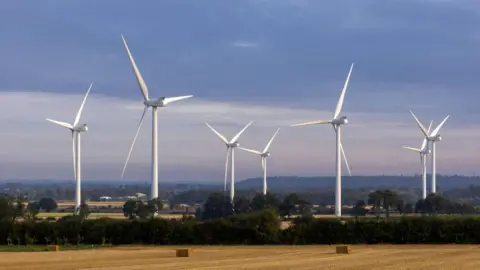 Getty Images
Getty ImagesWind provided more electricity than ever last year as the UK moved further away from planet-warming fossil fuels to power the nation, new data shows.
Wind generated nearly 83 terawatt-hours (TWh) of electricity across Great Britain (England, Wales and Scotland), up from nearly 79TWh in 2023, show figures from the National Energy System Operator (Neso), which coordinates electricity distribution.
Electricity generation from major fossil fuel power stations fell to just over a quarter of the total last year as other renewable sources, such as solar, also rose, along with electricity imports.
The government wants less than 5% of electricity to come from polluting fossil fuels by 2030.
Neso - the government's independent system planner and operator for the energy transition - has previously described the government's 'Clean Power 2030 Action Plan' as "achievable" but "at the limit of what is feasible".
The government considers clean electricity to include renewables, such as wind, solar, hydropower and bioenergy, as well as nuclear power.
Together, these sources generated around 56% of Great Britain's electricity in 2024 - a new high, according to preliminary Neso data that will be confirmed this week.
Major fossil fuel generation (mainly gas) fell to 26%, while a further 16% came from imported electricity.
Neso data does not cover Northern Ireland, which has its own electricity transmission system operator, SONI.
The figures only include fossil fuel and biomass generation from major power stations connected to the main transmission network. For these sources, Neso does not include smaller-scale operators that feed in electricity at a local level, although typically these contribute a relatively small fraction of fossil fuel power.
As a result, government figures for 2024 due in March, which will take into account all power sources, may differ slightly from Neso's data. But the direction of travel is clear.
Back in 2014, wind and solar accounted for around 10% of Great Britain's electricity. That has now risen to about a third, according to Neso's figures.
Over the same period, fossil fuel generation has fallen by more than half.
That is mainly thanks to a sharp fall in coal generation - the dirtiest fossil fuel - with the UK's final coal power station closing in 2024. Gas generation has also begun to decline.

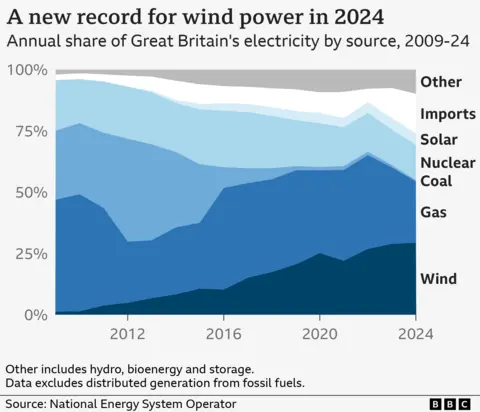
This has helped to significantly clean up Britain's power generation.
In 2024, each kilowatt-hour (kWh) of electricity generated 124g of planet-warming carbon dioxide on average - a new low, and down from 419g/kWh in 2014, according to Neso.
But gas remains a crucial part of the UK's electricity mix, helping to maintain power supply when output from weather-dependent wind and solar sources drops.
Britain's wind turbines can generate huge amounts of electricity when weather conditions are right, as shown by the darkest blue in the chart below.
On around 10 days in December alone, more than 50% of Great Britain's electricity generation came from wind.


However, there are of course less windy periods when electricity generation from wind drops. In the longer term, these gaps could be filled using emerging green technologies, such as batteries, to store energy during windier times.
There could also be extra incentives for people to use electricity during windy periods, for example by offering cheaper prices.
But for now, gas power stations, a ready source of on-demand energy, need to be fired up to fill the gaps. For three consecutive days between 11-13 December, for example, more than 60% of electricity generation came from gas as wind output dropped.
In its plan for meeting the 2030 clean energy target published last month, the government committed to keeping a reserve capacity of gas power stations for this purpose.
Last month Claire Coutinho, Conservative shadow secretary of state for energy security, said Labour's "rush" to decarbonise the electricity system by 2030 would push up electricity prices and cause more hardship for people across Britain.
"We need cheap, reliable energy - not even higher bills," she said.

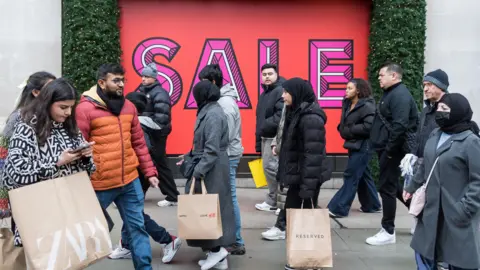 Getty Images
Getty ImagesShoppers spent more in December compared with the year before but it wasn't enough to make up for an overall lacklustre year for retailers, new figures suggest.
Doing particularly well over Christmas were gifts including beauty advent calendars, jewellery and AI-enabled tech, the British Retail Consortium (BRC) said.
December's growth of 3.2% was boosted by a big weekend of Black Friday sales, which are normally included in November's figures.
But with growth for the last three months of 2024 being only 0.4% higher than the previous year, it finishes a weak 12 months for retailers overall, and the BRC warned that 2025 would be "challenging" due to rising taxes and wage costs.
Although many firms are yet to report on their performance over the Christmas period, the BRC said the new year would see retailers grapple with rising National Insurance Contributions, a higher National Living Wage, as well as new packaging levies.
Meanwhile, Barclays reported that consumer spending on debit and credit cards was flat in December. It said people were splashing out on entertainment and leisure but this was offset by cutbacks in some essential spending.
Across the year, sales in 2024 were 0.7% higher than in 2023.
The BRC said a last-minute bump in December sales came from Christmas shopping and the fact that Black Friday sale was included in the month's figures.
"Food sales fared better over the Christmas period, ticking up slightly from the previous year, meanwhile beauty products, jewellery and electricals made a strong showing under the tree this year," said the BRC's chief executive Helen Dickinson.
Although slower than the year before, food sales increased over the year by 3.3%, and by a higher amount in December.
Budget supermarket Lidl said it had the most successful Christmas in its history, boosted by people buying festive food such as pigs in blankets and turkey.
But the BRC's figures showed people spent less on other things - sales for non-food items over the year fell by 1.5%.
Overall, the last three months of last year "failed to give 2024 the send-off retailers were hoping for", in a "challenging year marked by weak consumer confidence and difficult economic conditions", Ms Dickinson said.
Retail analyst Natalie Berg from NBK Retail said: "Consumers aren't battening down the hatches just yet."
But she added: "Shoppers will likely face higher prices and fewer discounts in the coming months."
Throughout the year, the number of people going to bricks-and-mortar shops fell for the second year in a row, the BRC found.
Footfall dropped 2.2% in 2024, having also fallen in 2023, despite some shops taking measures, such as offering free wine, to attract shoppers.
Even days considered to be bumper sales days for retailers have seen lower footfall.
In 2024, Boxing Day saw a 6.2% drop in visitors to High Streets, and a drop of 4.2% to shopping centres compared with the year before, data gathered by MRI Software showed.
In 2025, New Year sales in the first five days of January saw a decline in footfall, with high streets seeing almost 4% fewer visitors than 2024. MRI's Jenni Matthews said the decline was significant, and worsened by travel disruptions and snowfall.


© The New York Times

© Amir Levy/Getty Images

© Kenny Holston/The New York Times

 BBC
BBCWarning: This story contains distressing details.
Just before New Year, 21-year-old Shatha al-Sabbagh was out buying chocolate for her family's children from a shop in Jenin, in the occupied West Bank.
The "fearless" journalism student – who wanted to shed light on the suffering of the Palestinians – was with her mother, two young nephews and another relative.
"She was laughing and saying we'll be up all night tonight," her mother recalls.
Then she was shot in the head.
For Shatha's mother Umm al-Motassem, the pain is still raw. She stops to take a breath.
"Shatha's eyes were wide open. It looked like she was staring at me while lying on her back with blood gushing from her head.
"I started screaming, 'Stop shooting! My daughter is dead. My daughter is dead.'"
But the shooting lasted for around 10 minutes. Shatha died in a pool of her own blood.
Shatha's family holds the Palestinian Authority's (PA) security forces fully responsible for her killing, saying their area is controlled by the PA.
"It couldn't have been anyone other than PA... because they have such a heavy presence in our neighbourhood - no-one else could come or go," she told the BBC.
But the PA blames "outlaws" - the term they use for members of the Jenin Battalion, made up of fighters from armed groups including Palestinian Islamic Jihad (PIJ) and Hamas.
The PA exercises limited self-rule in the Israeli-occupied West Bank.
It launched a major security operation in the refugee camp in Jenin last month targeting the armed groups based there, which they see as a challenge to their authority. Nearly four weeks on, it continues.
The Jenin Battalion is accused of blowing up a car in the camp and carrying out other "illegal activities".
"We have confiscated large numbers of weapons and explosive materials," says the PA's Brig Gen Anwar Rajab.
"The aim is to clear the camp from the explosive devices that have been planted in different streets and alleyways... These outlaws have crossed all red lines and have spread chaos."
Gen Rajab also accuses Iran of backing and funding the armed groups in the camp.
The Jenin Battalion denies links to Iran. In a recent video posted on social media, spokesman Nour al-Bitar said the PA was trying to "demonise" them and "tarnish their image", adding that fighters would not give up their weapons.
"To the PA and President Mahmoud Abbas, why has it come to this?" he asked, holding shrapnel from what he claimed was a rocket-propelled grenade fired at the camp by security forces.

 Getty Images
Getty ImagesThe PA, led by President Abbas, was already unpopular among Palestinians dissatisfied by its rejection of armed struggle and its security co-ordination with Israel.
This anger intensified with the PA's crackdown on the armed groups in the camp, which has been unprecedented in its ferocity and length.
Israel sees those groups as terrorists, but many Jenin locals consider them to be a form of resistance to the occupation.
"These 'outlaws' that the PA is referring to – these are the young men who stand up for us when the Israeli army raids our camp," says Umm al-Motassem.
At least 14 people have been killed in the crackdown, including a 14-year-old, according to the Palestinian health ministry.
Now many Jenin locals say they fear the PA as much as they fear Israel's military raids. Shatha al-Sabbagh's death has only renewed their contempt.
Before she was killed, Shatha shared several posts on social media showing the destruction from the PA operation in Jenin - as well as Israeli raids on the camp last year.
Other posts showed pictures of armed young men who were killed in the fighting, including her brother.
Her killing was condemned by Hamas, which identified her brother as a slain member of the group's armed wing, the Izzedine al-Qassam Brigades.
The group described her "murder... in cold blood" as part of an "oppressive policy targeting the Jenin camp, which has become a symbol of steadfastness and resistance".
Mustafa Barghouti, who leads the political party Palestinian National Initiative, sees the fighting in Jenin as a consequence of the divisions between the main Palestinian factions - Fatah, which makes up most of the PA, and Hamas, which has governed Gaza since 2007.
"The last thing Palestinians need is to see Palestinians shooting each other while Israel crushes everyone," he says.

 Getty Images
Getty ImagesInside the camp, residents say daily life has ground to a halt.
Water and electricity supplies have been cut off and families suffer from a lack of food, bitterly cold weather and relentless gun battles.
Locals who spoke to us asked for their names to be changed, saying they feared reprisals by the PA.
"Things are dire here. We can't move freely in the camp," says Mohamed.
"All the bakeries, the restaurants and shops are closed. The restaurant I work in opens for a day and closes for 10. When it is open, no-one comes.
"We need milk for the children, we need bread. Some people can't open their doors because of the continuous shooting."
The UN humanitarian agency, the OCHA, has called for an investigation into what it describes as human rights violations by the PA forces.
Gen Rajab said some of the "outlaws" who had "hijacked" the Jenin camp had been arrested and that others with pending cases would be brought to justice.
But Mohamed describes the PA's operation - with innocent people caught in the crossfire - as "collective punishment".
"If they want to go after outlaws, that doesn't mean they should punish the whole camp. We want our lives back."
Even going out to get food or water is a risk, says 20-year-old Sadaf.
"When we go out, we say our final prayers. We prepare ourselves mentally that we may not come back.
"It's very cold. We've taken down the doors in our home to use as firewood just to keep warm."
The BBC has heard similar accounts from four residents in the camp.
My conversation with Sadaf is interrupted by the sound of gunfire. It is unclear where it is from or who is firing. It starts and stops several times.
"Warning shots maybe," she suggests, adding it happens sometimes when PA forces are changing shifts.
Sadaf continues describing the camp, with "rubbish filling the streets and almost going into homes". More gunfire can be heard.
Sadaf's mother joins the call. "Listen to this... Can anyone sleep with this sound in the background?
"We sleep in shifts now. We're so scared they might raid our homes. We're as scared of this operation as we are when the Israeli soldiers are here."
People say security forces have deliberately hit electricity grids and generators, leaving the camp in a blackout.
The PA again blames "outlaws" - and insists it has brought in workers to fix the grid.

 Getty Images
Getty ImagesThe armed groups want to "use the people's suffering to pressure the PA to stop the operation", says Gen Rajab. He says the security operation will continue until its objectives are met.
Gen Rajab says the PA's goal is to establish control over the Jenin camp and ensure safety and stability.
He believes stripping the armed groups of control would take away Israel's excuse to attack the camp.
In late August, the Israeli army conducted a major nine-day "counter-terrorism" operation in Jenin city and the camp, which resulted in severe destruction.
At least 36 Palestinians were killed - 21 from Jenin governorate - according to the Palestinian health ministry.
Analysts say that the PA is trying to reassert its authority in the West Bank and show the US it is capable of taking a role in the future governance of Gaza.
"What would be the harm in that?" says Gen Rajab.
"Gaza is part of the Palestinian state. Gaza and the West Bank are not separate entities. There's no Palestinian state without Gaza. The president [Mahmoud Abbas] has said that and that is our strategy."
But Barghouti says this approach is an "illusion". "All you need is to listen to what [Benjamin] Netanyahu says," he adds.
Under the Israeli prime minister's vision for a post-war Gaza, Israel would control security indefinitely, and Palestinians with "no links to groups hostile to Israel" - so none of the existing major Palestinian political parties - would run the territory.
But the US, Israel's major ally, wants the PA to govern Gaza after the war. Netanyahu has previously ruled out a post-war role for the internationally backed PA.
For the residents of Jenin camp, there has been no let-up in the violence and loss.
"The PA say they're here for our safety. Where's the safety when my daughter was killed? Where's the safety with the non-stop shooting?" Umm al-Motassem cries.
"They can go after the 'outlaws' but why did my daughter have to die? Justice will be served when I know who killed my daughter," she says.

 Getty Images
Getty ImagesNot even AI can predict the future (yet), nevertheless two of our tech editors have taken a look ahead to what they think will be big in 2025.
As 2022 drew to a close the outlook was bleak for the cryptocurrency business.
One of its best know firms, FTX, had collapsed with $8bn (£6.3bn) of customer funds unaccounted for.
In March of 2024, the company's co-founder Sam Bankman-Fried received a 25-year jail sentence for defrauding customers and investors.
The scandal rattled confidence in the whole sector.
It seemed that cryptocurrencies would remain a niche product, with an enthusiastic but relatively limited following.
But just a few months later and the industry was fizzing with optimism again. Behind the enthusiasm - the success of Donald Trump in the 5 November presidential election.
The feeling was that he would be more favourable to the cryptocurrency sector and, so far, that seems to be the case.
In early December, Trump said he would nominate former Securities and Exchange Commission (SEC) commissioner Paul Atkins to take up the top chairman role at the Wall Street regulator.
Mr Atkins is seen as being far more pro-cryptocurrency than outgoing head, Gary Gensler.
That announcement helped the value of one bitcoin, the biggest of the numerous cryptocurrencies, surge through $100,000.
"With Trump winning you can imagine in 2025 you'll get proactive regulation. You'll get removal of some negative regulation, which will then allow banks and other institutions into the space," says Geoffrey Kendrick, global head of digital assets research at Standard Chartered.
In particular, Mr Kendrick points to a piece of guidance issued by the SEC called SAB 121. Since taking effect in 2022 it has made it difficult for banks and other financial firms to provide cryptocurrency services.
Such a move might help Trump to fulfil his promise made in July to make the US the cryptocurrency capital of the world.
If he makes good on that pledge it would be a remarkable turnaround from 2021 when Trump described Bitcoin as a "scam".

 Getty Images
Getty ImagesAs AI tools move into our phones – Apple, Google and Samsung have all launched services that can edit photos, translate languages and carry out web searches – we are at the start of an era in which AI becomes an intrinsic part of our digital lives and increasingly helpful on a personal level.
That’s if we allow it, because it does require a bit of a leap of faith.
Let’s take diary management as an example. An AI tool efficiently can manage your diary for you, if you allow it to access it. But how far should this go?
In order to be truly useful, does that mean it also needs to know who you would rather avoid meeting, or relationships you want to keep secret, and from whom?
Do you want it to provide you with summaries of counselling sessions, or medical appointments?
It’s deeply personal information, and potentially both hugely embarrassing and extremely valuable if some glitch meant it was shared. Do you trust the big tech firms with that kind of data?
Microsoft is pushing hard at this particular door. It got into trouble in 2024 for demoing a tool called Recall, which took snapshots of laptop desktops every few seconds, in order to help users locate content they’d seen but couldn’t remember where.
It has now made a number of changes to the product – which was never launched – but stands by it.
“I think we’re moving to a fundamentally new age where there will be ever present, persistent, very capable co-pilot companions in your everyday life,” the firm's head of AI, Mustafa Suleyman told me recently.
Despite the challenges, Ben Wood, chief analyst at technology research company CCS Insight, expects that more personalised AI services will emerge in 2025.
"The output will be continuously updated by drawing on evolving data sources, such as emails, messages, documents and social media interactions.
“This will allow the AI service to be tuned specifically to a person's communication style, needs and preferences," he says.
But Mr Wood accepts that letting AI loose on your personal information will be a big step.
"Trust will be essential," says Mr Wood.

 Getty Images
Getty ImagesThe more money pours into AI, then the more datacentres will need building.
Training and running AI requires a lot of computing power, and works best with the latest computer chips and servers.
Over the next five years as much as $1tn could be invested in datacentres by the biggest data users, including Google, Microsoft and Meta, according to CCS Insight.
In Europe alone, between 2024 and 2028, data centre capacity is expected to grow by an average of 9% annually, according to property services company Savills.
But those new facilities are unlikely to be built in the current datacentre hubs like London, Frankfurt, and Amsterdam.
High property prices in those cities - Savills says that in London land prices can be as much as £17m per acre - plus tight electricity supply means developers will be looking elsewhere.
In the UK cities like Cambridge, Manchester and Birmingham could well be home to the next wave of datacentre construction.
Elsewhere, Prague, Genoa, Munich, Dusseldorf and Milan are likely to be considered in Europe.

 Getty Images
Getty ImagesAt the heart of some of those new datacentres will be the latest computer chip from Nvidia, the company that dominates the market for chips used for AI.
Unveiled in March 2024, the Blackwell chip is expected to start shipping in significant number in 2025.
The new chip should allow tech firms to train AI four times faster and see AI operate 30 times faster than current computer chips, according to Vivek Arya, senior semiconductors analyst, at Bank of America Securities.
Nvidia's biggest customers, Microsoft, Amazon, Meta and Coreweave are likely to get the tech first, according to reports.
But other customers might struggle to get their hands on the super chip, with "supply constrained in 2025", according to Mr Arya.

© Haiyun Jiang for The New York Times

© Pete Marovich for The New York Times

© Friedman-Abeles/The New York Public Library

© Mark Peterson for The New York Times
Under growing pressure from his own party, Canadian Prime Minister Justin Trudeau has announced he will step down and end his nine-year stretch as leader.
Trudeau said he would stay on in office until his Liberal Party can choose a new leader, and that parliament would be prorogued - or suspended - until 24 March.
"This country deserves a real choice in the next election and it has become clear to me that if I'm having to fight internal battles, I cannot be the best option in that election," he said during a press conference Monday.
Trudeau's personal unpopularity with Canadians had become an increasing drag on his party's fortunes in advance of federal elections later this year.
"Last night, over dinner, I told my kids about the decision that I'm sharing with you today," he told the news conference in Ottawa.
"I intend to resign as party leader, as prime minister, after the party selects its next leader through a robust nationwide competitive process," he said.
The president of the Liberal Party, Sachit Mehra, said a meeting of the party's board of directors would be held this week to begin the process of selecting a new leader.
Who might replace Trudeau as Liberal Party leader?
Why the Trudeau era has come to an end now
In a statement, he added: "Liberals across the country are immensely grateful to Justin Trudeau for more than a decade of leadership to our Party and the country."
"As Prime Minister, his vision delivered transformational progress for Canadians," he said, citing programmes his government has implemented like the Canada Child Benefit and the establishment of dental care and pharmacare coverage for some medication.
Conservative leader Pierre Poilievre said "nothing has changed" following Trudeau's resignation.
"Every Liberal MP and Leadership contender supported EVERYTHING Trudeau did for 9 years, and now they want to trick voters by swapping in another Liberal face to keep ripping off Canadians for another 4 years, just like Justin," Poilievre wrote on X.
Trudeau, 53, had faced growing calls to quit from inside his Liberal Party, which ramped up in December when deputy prime minister and long-time ally Chrystia Freeland abruptly resigned.
In a public resignation letter, Freeland cited US President-elect Donald Trump's threats of tariffs on Canadian goods, and accused Trudeau of not doing enough to address the "grave challenge" posed by Trump's proposals.
Trump has promised to impose a tax of 25% on imported Canadian goods - which economists have warned would significantly hurt Canada's economy - unless the country takes steps to increase security on its shared border.
Trudeau said Monday that he had hoped Freeland would have continued as deputy prime minister, "but she chose otherwise".
Canada has since announced that it will implement sweeping new security measures along the country's US border in response to the threat.
In an online post, Trump claimed that pressure over tariffs led to Trudeau's resignation and repeated his jibe that Canada should become "the 51st State".
"If Canada merged with the U.S., there would be no Tariffs, taxes would go way down, and they would be TOTALLY SECURE from the threat of the Russian and Chinese Ships that are constantly surrounding them," he wrote.
Since 2019, the Liberal Party has governed as a minority party.
Following Freeland's resignation, Trudeau lost the backing of parties that had previously helped keep the Liberals in power - the left-leaning New Democrats, who had a support agreement with the Liberals, and the Quebec nationalist party, Bloc Quebecois.
The largest opposition party, the Conservatives, have maintained a significant two-digit lead over the Liberals in polls for months - suggesting that if a general election were held today, the Liberals could be in for a significant defeat.
Liberals will now choose a new leader to take the party into the next election, which must be held on or before 20 October.
A senior government official told the BBC that the race is an open contest, and that the Prime Minister's Office will fully stay out of the process, leaving it to Liberal Party members to decide their future.
Speaking to reporters, the Bloc Quebecois leader Yves-François Blanchet suggested that an early election be called once the Liberals choose their new leader.
Trudeau is the son of Canadian Prime Minister Pierre Trudeau, who dominated the country's politics in the 1970s and '80s.
The younger Trudeau became prime minister after the Liberal Party won a sweeping majority in 2015 amid a promise to usher in a new, progressive era of "Sunny Ways".
His record includes a commitment to gender equality in his cabinet, which continues to be 50% women; progress on reconciliation with Indigenous people in Canada; bringing in a national carbon tax; implementing a tax-free child benefit for families; and legalising recreational cannabis.
Assembly of First Nations National Chief Cindy Woodhouse Nepinak praised Trudeau's track record on indigenous issues following his resignation, saying in a statement that he "has taken meaningful steps to address issues that matter to First Nations".
"While much work remains, these actions have laid a foundation for future governments to build upon."
Clouds began to hang over Trudeau's government in recent years, which weathered a series of often self-inflicted scandals, including a controversy over a deal with a Canadian firm facing corruption charges and photos that emerged of the prime minister wearing brownface makeup.
Vaccine mandates and other restrictions were also met with fierce backlash by some Canadians, leading to the Freedom Convoy truck protests in early 2022. Trudeau eventually used unprecedented emergency powers to remove the protesters.
As Canada began to emerge from the pandemic, housing and food prices skyrocketed, and his government pulled back on ambitious immigration targets as public services began to show strain.
By late 2024, Trudeau's approval rating was at its lowest - just 22% of Canadians saying they thought he was doing a good job, according to one polling tracker.
In Ottawa, a small group of protestors danced outside Parliament Hill in celebration of his resignation.
One passer-by, however, said he thinks things were fine under Trudeau's watch.
"I'm a carpenter," Hames Gamarra, who is from British Columbia, told the BBC. "I mind my own business, I get my wages, I pay the bills. It's been OK."
Another Canadian, Marise Cassivi, said it feels like the end of an era. Asked if she feels any hints of sadness, she replied: "No."
"It's the right thing."
At least five people have died in a winter storm that has seized a swathe of the US in its icy grip, leading to mass school closures, travel chaos and power cuts.
Seven US states declared emergencies: Maryland, Virginia, West Virginia, Kansas, Missouri, Kentucky and Arkansas.
More than 2,000 flights have been cancelled, with about 6,500 delays also reported owing to the extreme weather caused by the polar vortex of icy cold air that usually circles the North Pole.
More than a quarter of a million people were without power on Monday afternoon, with snowfall forecast to continue into the night on the East Coast.

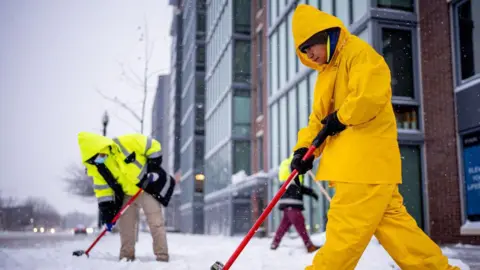 Getty Images
Getty ImagesAccording to meteorologists, cold Arctic air is expected to keep conditions icy across a chunk of the country for several more weeks.
In Washington DC - where lawmakers met on Monday to certify Donald Trump's win in November's election - about 5-9in (13-23cm) of snow fell, with up to a foot recorded in parts of nearby Maryland and Virginia.
In front of the Washington Monument, hundreds of local residents gathered at a local park for a snowball fight, a now 15-year-old tradition.
"Just having fun," one local man told the BBC. "Never done a snowball fight before."
Former US Olympic skier Clare Egan was found cross-country skiing on the National Mall, the central thoroughfare of the US capital city.
She told the Associated Press she had thought "my skiing days were maybe behind me".
Washington DC's weather emergency is declared until the early hours of Tuesday as a result of the system, which was named Winter Storm Blair by the Weather Channel.
Children who had been due to go back to classes on Monday after the Christmas and Hanukkah break were instead enjoying a snow day as school districts closed from Maryland to Kansas.

 Getty Images
Getty ImagesIn other parts of the US, the winter storm brought with it dangerous road conditions.
In Missouri, the state's highway patrol said at least 365 people had crashed on Sunday, leaving dozens injured and at least one dead.
In nearby Kansas, one of the worst-hit states, local news reported that two people were killed in a car crash during the storm.
In Houston, Texas, a person was found dead from cold weather in front of a bus stop on Monday morning, authorities said.
In Virginia, where 300 car crashes were reported between midnight and Monday morning, authorities warned local residents to avoid driving in large parts of the state.
At least one motorist was killed, according to local media reports.

 Getty Images
Getty ImagesMatthew Cappucci, a senior meteorologist at the weather app MyRadar, told the BBC that Kansas City had seen the heaviest snow in 32 years.
Some areas near the Ohio River in Kansas and Missouri turned to "skating rinks" in the frigid temperatures, he added.
"The ploughs are getting stuck, the police are getting stuck, everybody's getting stuck - stay home," he said.
Data from Poweroutage.us, a tracking website, shows that over 260,000 people were without power on Monday afternoon, across the storm's path through Missouri, Illinois, Indiana, Kentucky, Virginia and West Virginia.

 Jordan Maclachlan family
Jordan Maclachlan familyA Scot has been killed while serving as a medic with the Ukrainian army, his family has said.
Jordan Maclachlan, 26, from Ardnamurchan, volunteered to help Ukraine after Russia's invasion in February 2022.
His family said he died on Friday while serving on the frontline.
In a statement, they said: "Jordan always believed that he was making a difference and we are all so proud of him helping others."
Mr Maclachlan's family said he joined Ukraine's army soon after volunteering three years ago.
They said: "We are waiting for further information from the Foreign Office as information is very limited.
"Jordan was a fun-loving son, brother, grandson, nephew, cousin and a friend to many and will be greatly missed by all who knew him."
The family asked for privacy at a difficult time.
A Foreign, Commonwealth and Development Office spokesperson said: "We are supporting the family of a British man who died in Ukraine and are in contact with the local authorities."
The FCDO advises against all travel to certain parts of Ukraine and all but essential travel to other areas of the country.
A number of Scots have made the perilous trip since the Russian invasion was launched on 24 February 2022.
Six months later a mechanic from Biggar, South Lanarkshire, who joined the fight against Russia, was hailed as a hero in his adopted country.
Adam Ennis, 35, left his garage business to join the international legion, with just basic training he gained from a cadet scheme at school.
But in December 2022 another volunteer, Jonathan Shenkin, from Glasgow, was killed in Ukraine.
A family tribute on social media said Mr Shenkin, 45, "died as a hero in an act of bravery as a paramedic".

England last played Afghanistan at the 2023 World Cup
The England and Wales Cricket Board has called for a unified response to action against Afghanistan amid calls for the England men's team to boycott next month's Champions Trophy match between the sides.
England are due to face Afghanistan in Lahore on 26 February, but UK politicians want the team to refuse to play the 50-over match and take a stand against the Taliban regime's assault on women's rights.
A letter to the ECB, written by Labour MP Tonia Antoniazzi, and signed by the likes of Reform UK leader Nigel Farage, and former Labour leaders Jeremy Corbyn and Lord Kinnock, urged England to boycott the match to "send a clear signal" that "such grotesque abuses will not be tolerated".
Women's participation in sport has effectively been outlawed since the Taliban's return to power in 2021 and many of Afghanistan's female players left the country for their own safety.
International Cricket Council (ICC) regulations state full membership is conditional upon having women's cricket teams and pathway structures in place.
However, Afghanistan's men's team have been allowed to participate in ICC tournaments seemingly without any sanctions.
In response to the letter signed by group of more than 160 politicians calling for a boycott, ECB chief executive Richard Gould said the governing body "is committed to finding a solution" which "upholds the rights of women and girls in Afghanistan".
"While there has not been a consensus on further international action within the ICC, the ECB will continue to actively advocate for such measures," he said.
"A coordinated, ICC-wide approach would be significantly more impactful than unilateral actions by individual members."
Gould said the ECB will continue its policy of not scheduling bilateral matches against Afghanistan but did not commit either way to a boycott.
He added that the ECB will engage with the UK government, other international boards and the ICC to "explore all possible avenues for meaningful change" but acknowledged there were "diverse perspectives" on the issue.
"We understand the concerns raised by those who believe that a boycott of men's cricket could inadvertently support the Taliban's efforts to suppress freedoms and isolate Afghan society," Gould added.
"It's crucial to recognise the importance of cricket as a source of hope and positivity for many Afghans, including those displaced from the country."
The Department for Culture, Media and Sport (DCMS) is in contact with the ECB over the wider issue of the Afghanistan women's cricket team.
"We are deeply concerned by the appalling erosion of women's and girls' rights in Afghanistan," a DCMS spokesperson said.
"We welcome the fact that the ECB are making representations to the ICC on this wider issue and what support can be given."
The Afghanistan women's team was created in 2010, nine years after the Taliban regime fell at the hands of a US-led military coalition.
The Afghanistan Cricket Board (ACB) initially barred the women's team from playing at several international tournaments, saying it received "Taliban threats".
Twenty-five female cricketers were handed contracts by the ACB in 2020. Less than a year later the Taliban returned to power, ending any progress towards Afghanistan playing an official women's international.
More than 20 Afghan women's cricketers managed to leave the country and are currently living in Australia.
England have played Afghanistan three times in one-day internationals and T20 internationals - all at ICC events - and lost their most recent meeting at the 2023 50-over World Cup.
Pakistan and neutral venue Dubai will host the eight-team Champions Trophy from 19 February to 9 March. Australia and South Africa join England and Afghanistan in Group B, while Pakistan, India, New Zealand and Bangladesh meet in Group A.
